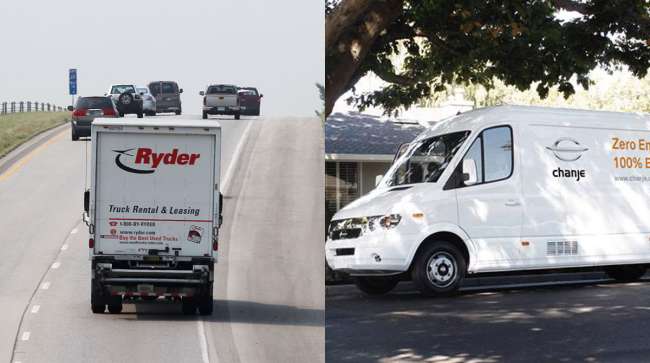Senior Reporter
Ryder Seeks $3.7 Million Default Judgment Against Chanje

[Stay on top of transportation news: Get TTNews in your inbox.]
Ryder Truck Rental Inc. asked a federal judge to issue a $3.7 million default judgment in its civil lawsuit against a Chinese-backed truck maker that allegedly failed to make good on promises to deliver 100 Class 5 electric vehicles to Ryder in 2017.
Ryder filed its lawsuit in federal court in Florida on March 17. Two days later, it said it served the company, Chanje Energy Inc., with a summons and copy of the lawsuit with Chanje’s registered agent in Delaware.
But because Chanje as of July 6 still had not filed a response to Ryder’s complaint in a timely manner, Ryder said it should be paid the full damages, and that an initial default entered on June 16 should remain in effect, according to court documents. On July 2, three weeks after an initial default was entered, Chanje’s counsel filed notices of appearance, but have to date not provided an answer to Ryder’s formal complaint.

How do you care for your tires? Host Michael Freeze sets out to answer what factors fleets should consider when investing in TPMS and ATIS. He's joined by Matt Wilson of Hendrickson. Hear a snippet above, and get the full program by going to RoadSigns.TTNews.com.
Federal rules of civil procedure require that a defendant in a lawsuit must within 21 days after service of a summons respond to the plaintiff in an answer or motion to the complaint.
Ryder said that the “belated and untimely appearances do not negate the default already entered — nor do they change the relief that Ryder is entitled to.”
In total, Chanje owes $3.7 million, and Ryder said in court documents that the Chinese company has agreed that it owes the amount to Ryder. That total was a result of Ryder making an advance overpayment for 100 vehicles pursuant to a June 2017 purchase order agreement.
On June 26, 2017, Ryder made an initial deposit in the amount of nearly $4.4 million for 125 Chanje vehicles ordered in the June 2017 purchase order. However, Chanje failed to deliver 100 of the 125 vehicles that were part of the purchase order, Ryder has alleged.
Chanje has acknowledged the overpayment, but retained the overpayment amount and has not returned the funds, despite acknowledging that the overpayment amount is due back to Ryder, according to Ryder’s lawsuit.
“This is an action by Ryder to recover damages from defendants’ failure to satisfy their payment obligations under two separate promissory notes, stemming from defendants’ failure to fulfill numerous obligations spanning multiple agreements between the parties,” the Ryder lawsuit said. “Ryder has expended enormous efforts to assist defendants’ companies in expanding their presence in the U.S. market, but after facing repeated nonperformance and unfulfilled commitments, Ryder cannot sit idly by and must recover its losses.”
Ryder originally had big designs on acquiring Chanje’s electric vehicles.
“The whole idea of the partnership between Chanje and Ryder is to create that springboard effect so we can provide the Chanje product all across the North American market,” Chris Nordh, then Ryder’s senior director of Advanced Vehicle Technology, told Transport Topics in November 2018.
The 2017 purchase order only required Ryder to pay Chanje an initial deposit of $35,000 per vehicle upon execution of the purchase order and a remaining balance of $10,000 per vehicle upon delivery.
In what it called a “mistake,” Ryder made a payment for the 22 vehicles of $45,000 per vehicle — the entire cost of the vehicle — rather than the remaining balance due of $10,000 per vehicle. That resulted in an overpayment of $770,000, Ryder said.
Ryder said Chanje deposited the funds and has not totally returned the overpayment.
Attorneys representing the two companies did not return a message seeking comment at press time.
Want more news? Listen to today's daily briefing below or go here for more info:




